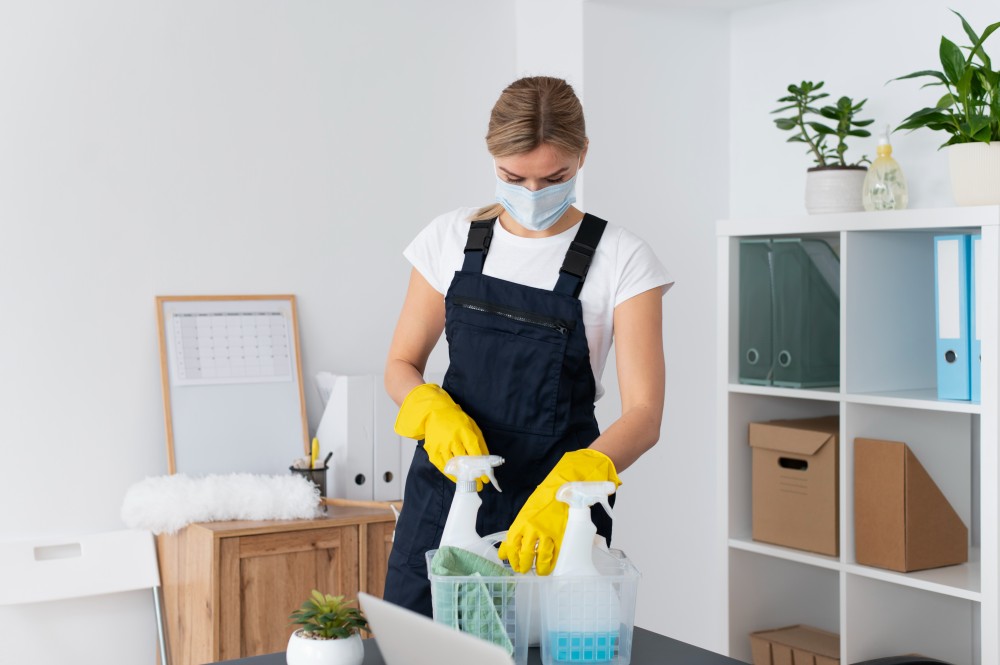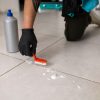- Empty cart.
- Continue Shopping
Types of Disinfectants: Making the Best Choice for Effective Facility Cleaning

Sanitizing and disinfectation are perhaps the buzzwords of the world that we live in today. Regardless of your setting that you are operating – a healthcare facility, an office, a school, or a large industrial establishment – the importance of adequate cleaning cannot be overemphasized. And that is not merely about getting a place to look neat and tidy, it is about achieving a hygienic environment which eliminates microorganisms including bacterial, viral and fungal infections that are a threat to human health.
Chemicals used for cleaning or disinfecting surfaces are especially important to reaching such a state of sanitation. These chemical agents are meant to kill or prevent the growth of microbes on surfaces and other items of usage. Nevertheless, the variety of disinfectant products is impressive, which means that selection of the most appropriate cleaning tool may be problematic in certain cases. There is a host of disinfectants and the disinfectants differ in the type of pathogen that they can remove, the efficacy, type of applications, and the zones that they can be used for.
This information about the disinfectants and their characteristics will help make the right choice and keep your facility clean and safe for people.
Understanding Disinfectants
Chemicals that are used to kill or prevent the growth of bacteria and other pathogens on surfaces, as well as on objects which are used to disinfect surfaces. It is extremely important in highly sanitized workplaces including the health facilities, food industries, public places and the like. However, not all disinfectants are alike and different disinfectants do not penetrate the same microbe. Knowledge on the types of disinfectants around shall help you choose the right one depending on your requirement.
Types of Disinfectants
There are several types of disinfectants, each with different properties and uses. Below are the most common types of disinfectants used in various cleaning environments:
-
Alcohol-Based Disinfectants
Most alcohol-based disinfectants contain ethanol or isopropyl alcohol in equal proportion of 30 percent or 70 percent. Such disinfectants are known to have bactericidal and virucidal properties, which are preferred used on healthcare and medical facilities. It functions by first of all, unfolding the proteins of some microbes, which causes them to break into cells and die.
Pros:
- Fast-acting and evaporate quickly
- Effective against a wide range of bacteria and viruses
- Leave no residue, making them suitable for use on electronics and surfaces where moisture is a concern
Cons:
- Not effective against spores and some fungi
- Highly flammable, so caution is required when using around heat sources
- Can cause skin irritation with frequent use
Best Use: Alcohol based disinfectants are best suited when there are many surfaces for example keyboards, phones or in case of medical use of equipment. They are widely employed in hand antibacterial wipes or sanitizers.
-
Quaternary Ammonium Compounds (Quats)
Quats are practically one of the most employed disinfectants because of their non-specificity and efficiency. They override the cell walls of microorganisms affecting the cell to rupture and at times, even burst. Quats are nonselective and active against bacteria, viruses, and fungi, as well as against spores.
Pros:
- Broad-spectrum effectiveness
- Non-corrosive and safe for most surfaces
- Available in various formulations, including sprays, wipes, and concentrates
Cons:
- May lose effectiveness when mixed with soaps or other cleaning agents
- Some bacteria may develop resistance over time
- Not effective against spores
Best Use: Quats are usually used in food service areas, health care facilities, nursing homes and schools. They are however very useful in the process of removing germs from hard surfaces which include counters, floor, and walls.
-
Chlorine-Based Disinfectants
Sodium hypochlorite or bleaching powder is used to disinfected chlorine-base since they have the capability to inactivate or eliminate different kinds of microorganisms that include bacteria, viruses and spores. These disinfectants are effective in oxidizing the walls of the cell of microorganism and bring about their disintegration and destruction.
Pros:
- Highly effective against bacteria, viruses, and fungi
- Inexpensive and readily available
- Fast-acting, killing microorganisms within minutes
Cons:
- Can be corrosive to metals and damage certain surfaces
- Requires proper dilution to avoid harmful fumes
- Not suitable for use on soft fabrics or delicate surfaces
Best Use: It can be used to clean and disinfect engineering systems, including hospital infected area and public rest room; and also, in swimming pools. They are also used to clean large surfaces like floor and walls and for that purpose they can even act as disinfectants.
-
Hydrogen Peroxide-Based Disinfectants
The use of hydrogen peroxide is a strong oxidizing agent, made of free radicals that demolish the key constituents of microorganisms. Due to its efficiency hydrogen peroxide-based disinfectants work perfectly on bacteria, virus and fungi and are also widely used in the healthcare facilities and the food industry.
Pros:
- Effective against a broad range of microorganisms, including spores
- Breaks down into water and oxygen, making it environmentally friendly
- Non-corrosive and safe for most surfaces
Cons:
- Can cause skin irritation if used in high concentrations
- Less stable than other disinfectants, requiring proper storage
Best Use: The hydrogen peroxide disinfectants are suitable when used in the healthcare facilities, food processing plants and anywhere else where green product solutions are desirable.
-
Iodophor Disinfectants
Iodophors are a group of disinfectant compounds in which iodine is associated with a partner molecule, often an organic compound, to enhance bacterial, viral and fungal kill. They act by compromising the cell membranes of microorganisms, interfering with many of their metabolic pathways or simply by/killing them. Iodophors are common used in hospitals and food handling centers because of its efficiency and low level of hazard.
Pros:
- Broad-spectrum effectiveness
- Safe for use in food preparation areas
- Non-corrosive and stable in solution
Cons:
- Can stain surfaces and fabrics
- Less effective against bacterial spores
- Requires proper dilution to avoid skin irritation
Best Use: Iodophors are popular in food processing industries, health-related facilities and other research centres. They are also applied to sterilise surgical tool and equipment.
-
Phenolic Disinfectants
Coal tar phenolic disinfectants have been employed in the clinical environment for over fifty years. PAN’s work by causing protein denaturation and the cell membrane of microbes to become disrupted. Phenolics work against bacteria, viruses and fungi and this include the bacterium that causes tuberculosis.
Pros:
- Effective against a wide range of pathogens, including tuberculosis
- Long-lasting residual activity on surfaces
- Non-corrosive to most surfaces
Cons:
- Toxic if ingested or inhaled in large amounts
- Not effective against bacterial spores
- May cause skin irritation
Best Use: Phenolic disinfectants are widely in use in various establishments such as hospitals and health facilities, laboratories and nursing homes for disinfection of floors, walls and medical equipment and utensils.
Choosing the Right Disinfectant for Your Facility
When choosing a disinfectant for your facility it is necessary to take into account following factors: the specific kinds of microorganisms that have to be eliminated, the types of the surfaces that have to be disinfected and safety conditions of the place.
- Target Pathogens: These are false because different disinfectants work on various manner when it comes to the microorganisms. For instance, using chemicals such as Scotch, alcohol- based disinfectant are good for bacteria and virus, but these are not good for spore- based chemicals, while using compounds like hypo, chlorine-base disinfectants are ideal for broad range of microorganisms inclusive of spore-based.
- Surface Compatibility: Some of the disinfectants as mentioned above are capable of destroying some materials. For instance, Chlorine-based disinfectants attack metals and are unsuitable for treatment of fabrics, one has to ensure that he or she uses the right disinfectant for surfaces respectively found in his or her facility.
- Safety Considerations: Some disinfectants emit toxic vapors or have negative impact on skin, thus the products should be eco-friendly. Chemical disinfectants must always be treated with proper ventilation and protective clothing such us gloves and masks.
- Environmentally Friendly Options: However, if environmental effects are become a major concern, then it is likely that using hydrogen peroxide as disinfectant would be more advisable since this material decomposes into water and oxygen only along the cleaning process.
Specialized Disinfectant Products
In addition to understanding the general types of disinfectants, specialized products like Super Care Citrus Pine Disinfectant, Super Care Floral Disinfectant, and Super Care Disinfectant Lavender offer targeted cleaning solutions. These disinfectants not only kill bacteria and viruses but also leave behind pleasant fragrances, making them ideal for environments where odor control is important, such as restrooms, gyms, and office spaces.
Conclusion
Therefore, choosing the most appropriate disinfectant to use in the healthcare facility is very important towards increasing the safety of the healthcare facility. This way, you will be certain that you are using the right disinfectant for your surfaces and it has the right properties to protect you from diseases causing pathogens. Whether you go with alcohol-based, chlorine-based, or Super Care Citrus Pine Disinfectant and other specialty products the right disinfectant choice will improve your cleaning and sanitation and raise the level of safety in the facility.
Hygiene For All embraces the need for offering quality hygiene solutions for the various cleaning requirements we have. That is why we have developed Hygiene For All- a one of its kind hygiene e-commerce stores, exclusive to everybody. We source and supply a broad range of disinfectants and other products that you can use in your small business or a large facility to ensure a clean environment. Check out current offer and become the owner of the perfect equipment to enhance your facility’s hygiene.





